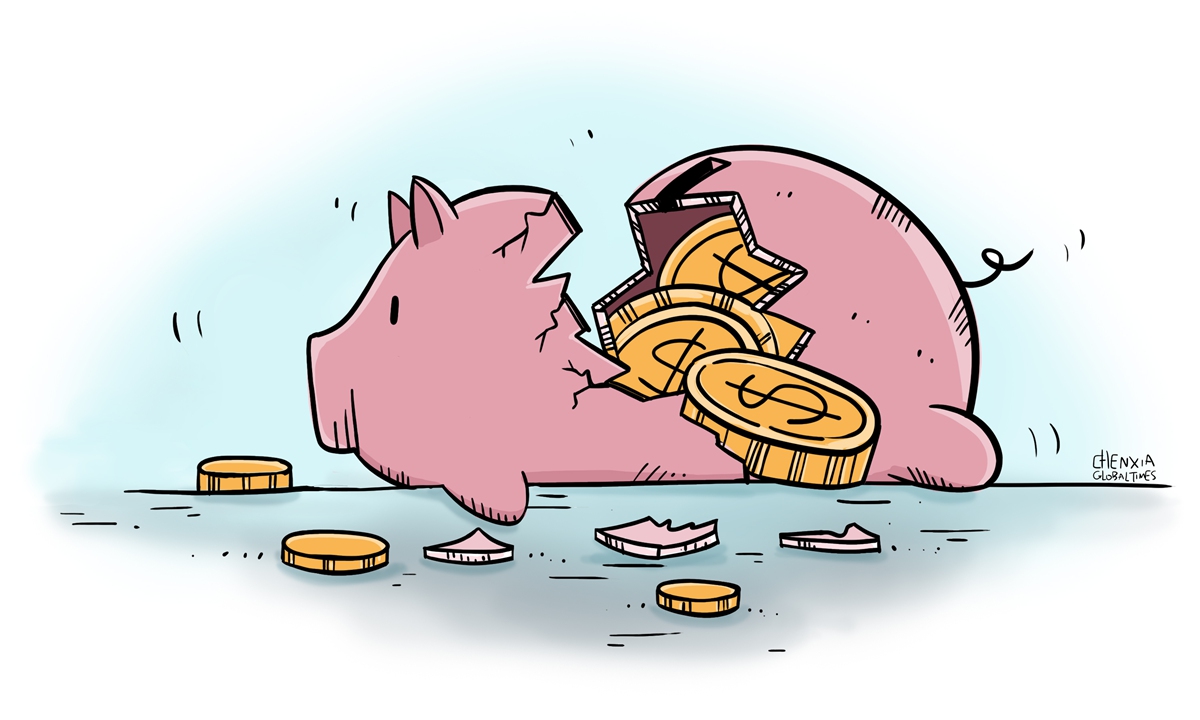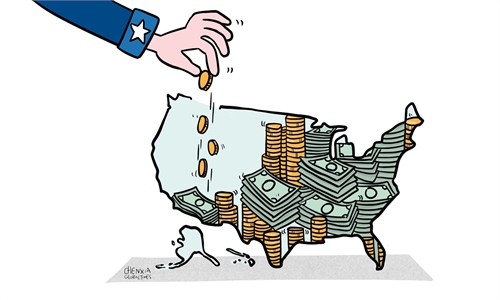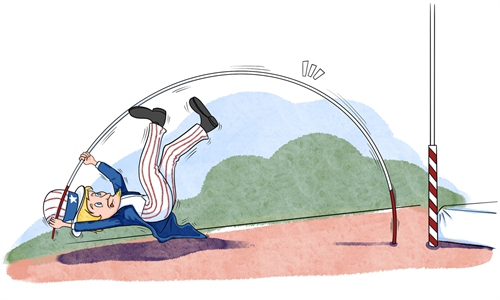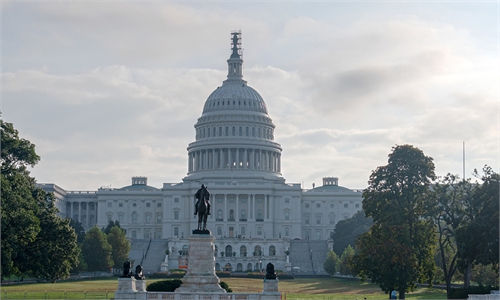COMMENTS / EXPERT ASSESSMENT
US economic prospect is bleak, may slip into stagflation in 2022

Illustration: Chen Xia/Global Times
It is always difficult to predict the economic development trends at the beginning of a new year, especially as the Omicron, Delta and other mutations of the coronavirus combine to throw many countries into disarray. Also, the geopolitical uncertainty resulting from the US government's desperation to impede the growth of China, Russia and other economies is unlikely to abate soon, which will create more divisions in the world and possibly make the prospects for the global economy even bleaker.In the US, the so-called "Great Resignation" of the last two years is to continue as Americans, concerned about the pandemic, choose to stay at home and refuse to work, exacerbated by across-the-board price inflation, and expected higher interest rates from the Federal Reserve, may lead to depressed economic growth. It will be very hard for the US to maintain a GDP growth rate of 2.5 percent in 2022. Whether the US economy will slip into stagflation like the late 1970s remains to be seen.
Ordinary American reliance on government hand-outs and Fed's money printing will be broken because they will find the dollar is depreciating in value and buys less on the market. Imports from Mexico, Canada, Asia and Europe to the US will become more expensive as dollar-denominated raw materials, like crude oil, ore and wood, hike production costs on a global level.
Another prominent factor contributing to a possible stagflation in the US is the tariffs war with China. Economists have long warned that the US trade protectionism will lower its industrial competitiveness and cause recessions, like the 1929-1933 Great Depression when factories were shut down, unemployment skyrocketed and Wall Street imploded. It will be interesting to assess whether President Joe Biden will be remembered by history as another Herbert Hoover.
In contrast, China will remain as the engine of the world's economy in 2022, and all other countries that maintain friendly trading and investment relations with China will significantly benefit - including all the partner countries of RCEP and Belt & Road. The tariffs between China and Japan are drastically decreasing, as RCEP comes into effect on the New Year's Day and the two countries' goods now enjoy free-trade treatment. European economies, like Germany and France, will continue to benefit from expanding trade with China.
Domestically, Chinese economy in 2022 will be shored up by stronger public and private sector investment, and the government's drive to stimulate high-tech production and household consumption.
Provided China's infrastructure investment keeps growing, enterprises' technology innovation doesn't let up and productivity continues to improve, and the government's efforts to shorten social divide by vigorously promoting "common prosperity" and increasing the wage levels for the majority of workers, the country's economy will be greeting another five years of 5-7 percent annual growth during the 14th Five-Year Plan period (2021-25).
On high-tech production and consumption, Huawei just released an electric vehicle brand called AITO M5 in late December, powered with Huawei's self-developed HarmonyOS and its 5G-backed navigation and infotainment systems. Within 5 days of the car's debut, orders have surpassed 6,000 cars. Electric cars are selling amazingly well in China. The country's Association of Automotive Manufacturers said that the penetration of new-energy vehicles (NEVs) in the country is nearing 18 percent, and 2021 saw more than 3 million electric vehicles being snapped up by Chinese consumers. The association predicts 5 million NEV sales in 2022, as the Chinese people embrace low-carbon life.
Vibrant manufacturing industry innovations are increasingly driving China's economic growth. An research piece by Caijing Magazine shows the 10 industrial lines that experienced rapid domestic expansion in 2021 include high-quality iron and steel, non-ferrous metals, chemicals, bio-medicine, electronics, solar panels, semiconductor chips, rare earths, electric batteries, and new energy vehicles. These sectors will continue to bolster the Chinese economy.
And, in 2022, digital transformation of China's services sector will also accelerate, which will greatly improve efficiency and bring more conveniences to daily lives. Take the China Merchants Bank (CMB) for an example, a range of new technologies like 5G and AI are broadly utilized. Aided by the bank's all-in-one mobile app, customers "anywhere", and at "anytime", can use "any mobile device" to manage one's account, transfer funds, readjust portfolio, pay bills, buy the bank's own wealth products, or invest in insurances, bonds and stocks. And, with the trial experimentation of digital Renminbi now in full swing, the country's services sector, such as e-commerce, sharing services and online entertainment, is expected to receive a big boost.
When agricultural, manufacturing and services sectors are all becoming smarter under the government's digitalization campaign, Chinese companies' overall competitiveness is to be sharpened that will eventually guarantee the country's persistent GDP growth and wealth rise.
But like any economy, China's economy is not devoid of risks. The most conspicuous risk is how to diffuse the risks associated with the debt-ridden China Evergrande Group. Since the property conglomerate's debt woes were exposed in September 2021, the country's central bank has put Evergrande under close monitoring, preventing the developer's levels of debt from worsening and spilling over to endanger the country's financial system. For a time, China's regulators have bristled at Evergande's unrestrained borrowing practices, and the company's reckless expansion into many non-property sectors.
Lately and also auspiciously, thanks to the regulators' paying special heed to resolving the debt, Evergrande seems to have been pulled away from the precipice. The developer has pledged to deliver finished apartments and houses to the buyers, and start paying its own workers again, part of a push to restore confidence in the company and the property sector - a very important lever supporting China's giant economy.
The author is an editor with the Global Times. bizopinion@globaltimes.com.cn



